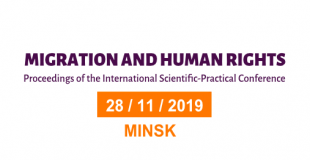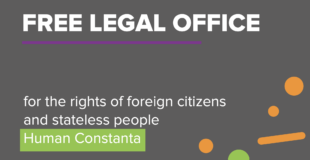On 13 July 2021 during an emergency session of Lithuania’s parliament, it has passed a resolution, which proposes to qualify undocumented migrants crossing the Belarusian-Lithuanian border as participants of a hybrid attack of Belarus against Lithuania. The document does not define the term “hybrid attack” and does not qualify such notion from the international law viewpoint.
The Parliament has also approved the amendments to the Law on the Legal Status of Foreign Citizens (hereinafter – the Law), which allows to arrest and detain foreigners, as well as to limit their right to leave their place of residence, if they have entered the country illegally or crossed the border while the state of emergency was in place. The new edition of the Law limits the right of migrants to appeal the refusal to grant asylum in court and stipulates that migrants can be deported even when their appeals are being considered. Therefore, the Law allows for mass detention of foreigners, whose entry is deemed illegal, and significantly limits their access to legal remedies.
Since the beginning of 2021, more than 1700 migrants have been detained in Lithuania, the majority of whom applied for international protection. Many of the incoming migrants belong to vulnerable groups on the basis of their race, nationality, gender, religion, or social status. People are detained and held in the conditions, where they are limited in their access to information, interpreters’ services, consultations of human rights defenders and lawyers, who could provide qualified assistance and monitor the authorities’ compliance with the minimum standards of detention.
According to the normative acts of the European Union in the sphere of migration and asylum, based on the well-established rules of international law, member states of the European Union undertake to consider asylum applications, submitted by any foreigners at the border or on the territory of the country in question. Moreover, any foreigner who applies for international protection, irrespective of the manner in which she/he crossed the border must receive the guarantees of non-expulsion, while the decision on granting protection is pending. National laws of the member states must also provide for the right of foreigners to appeal the authorities’ refusal to grant them protection. While the decision is pending, the foreigners must be allowed to remain in the territory of the state, where their applications are being considered.
Prima facie Lithuanian laws are fully compliant with the European Union standards and provide for the aforementioned guarantees for the asylum-seekers. Article 130 of the Law enshrines the generally recognized principle of “non-refoulement,” according to which a person applying for international protection may not be returned to a state where her/his life or liberty would be at risk, where she/he may be persecuted based on race, religion, nationality, social status, or political opinion, or to a state, which may later return them to the state, where the person is at risk of persecution.
However, the resolution of Lithuania’s parliament on ascribing a special status to migrants coming from the Belarusian territory is in breach of Lithuanian domestic laws, the European Union standards, and rules of international law in the field of treatment of persons, seeking asylum or international protection. The significant change of migration policies entails the risk of violating human rights of migrants. Despite the bad faith conduct of the Belarusian authorities, influencing the migration flows, people who end up at the border are, first and foremost, humans and not the objects of inter-state aggressions.
The notion of “hybrid aggression” only exists in political discourse and is not legally defined. There are no criteria in international law, which regulate who can be qualified as an “active participant of hybrid aggression.” Therefore, foreigners face limitations on their human rights on political grounds and not on the basis of international law. Such qualification of migrants is also in breach of the generally recognized principle of presumption of innocence, since the incoming migrants are automatically recognized as participants of an allegedly unlawful act of “hybrid aggression,” until the opposite is proven. Given the limited access to legal remedies in Lithuanian courts, proving one’s innocence is borderline impossible.
Despite the unprecedented political pressure on Lithuanian institutions and the attempts of Lithuanian authorities to safeguard the country’s national security, we call upon the government of Lithuania to comply with the minimum standards in the field of treatment of persons, seeking asylum or international protection, and to respect binding human rights obligations, Lithuania has undertaken to implement. In political standoff, people should not suffer and human rights standards should not be violated.






